中考英语常见知识点
中考英语全部知识点汇总

中考英语全部知识点汇总1.时态:一般现在时、一般过去时、一般将来时、现在进行时、过去进行时、过去将来时、现在完成时等。
2.名词:单数名词、复数名词、不可数名词、可数名词前的限定词等。
3.代词:人称代词、物主代词、反身代词等。
4.形容词和副词:形容词的比较级和最高级、副词的比较级和最高级等。
5.冠词:定冠词、不定冠词和零冠词的用法。
6.动词:动词的时态、语态、情态动词的用法、不定式、动名词等。
7.介词:表示时间、地点、方式等关系的介词的用法。
8.连词:并列连词、选择连词、原因连词、条件连词等。
9.数词:基数词、序数词、分数词等。
10.人称:第一人称、第二人称、第三人称等。
11.疑问词:询问人、地、时间、原因、方式、数量等的疑问词的用法。
12. 强调句型:It is... that...句型的用法。
13.倒装句:完全倒装句、部分倒装句等。
14.被动语态:一般现在时、一般过去时、一般将来时的被动语态的用法。
15.宾语从句:引导宾语从句的引导词的用法。
16.定语从句:引导定语从句的引导词的用法。
17.状语从句:时间状语从句、条件状语从句、方式状语从句、地点状语从句等。
18.名词性从句:主语从句、宾语从句、表语从句等。
19.并列句:连接并列句的连词的用法。
20.简单句:主谓结构、主谓宾结构、主谓表结构。
21.复合句:主从复合句、从属连词引导的句子。
22.比较级和最高级:形容词和副词的比较级和最高级形式的构成和用法。
23.句型转换:祈使句、感叹句、反义疑问句等句型的转换。
24.词汇:常用动词、形容词、副词、短语、习惯用语和常用短语等。
25.阅读理解:根据文章内容回答问题、根据文章理解并推断意义、根据文章选择正确答案、回答文章也提出的问题等。
26.完形填空:根据短文内容选择正确的词或词组填空。
27.书面表达:根据题目要求写一篇文章或对话。
以上为中考英语全部知识点的部分汇总。
希望对你的学习有所帮助。
中考英语试卷知识点总结

一、词汇1. 常见动词:am/is/are,have/has,do/does,go,do,make,take,get,see,have,be等。
2. 常用形容词:good,bad,big,small,tall,short,young,old,happy,sad等。
3. 常用名词:man,woman,boy,girl,teacher,student,book,school,home 等。
4. 常用介词:in,on,at,by,with,of,for,to,from等。
5. 常用连词:and,but,or,because,if,when,while等。
二、语法1. 一般现在时:表示经常性、习惯性动作或存在的状态。
2. 一般过去时:表示过去某个时间发生的动作或存在的状态。
3. 一般将来时:表示将来某个时间将要发生的动作或存在的状态。
4. 现在进行时:表示正在进行的动作或存在的状态。
5. 过去进行时:表示过去某个时间正在进行的动作或存在的状态。
6. 将来进行时:表示将来某个时间将要进行的动作或存在的状态。
7. 宾语从句:由从属连词引导,作动词、形容词、名词等的宾语。
8. 状语从句:由从属连词引导,作状语,表示时间、地点、原因、条件等。
9. 非谓语动词:包括现在分词、过去分词、动名词和不定式。
10. 时态和语态:包括一般现在时、一般过去时、一般将来时、现在进行时、过去进行时、将来进行时、现在完成时、过去完成时、现在完成进行时、过去完成进行时、被动语态等。
三、阅读理解1. 仔细阅读文章,理解文章大意。
2. 分析文章结构,掌握文章主旨。
3. 根据文章内容,回答问题。
4. 理解文章中的关键词汇和短语。
5. 分析作者的观点和态度。
四、完形填空1. 仔细阅读文章,理解文章大意。
2. 根据文章上下文,选择合适的词汇填空。
3. 注意词汇的词性和搭配。
4. 分析文章结构,掌握文章主旨。
5. 注意文章中的逻辑关系。
五、写作1. 仔细审题,明确写作要求。
中考英语知识点总结

中考英语知识点总结总结,希望对您有所帮助。
欢迎大家阅读参考学习!中考英语知识点总结1、词类:英语词类分十种:名词、形容词、代词、数词、冠词、动词、副词、介词、连词、感叹词。
1、名词(n.):表示人、事物、地点或抽象概念的名称。
如:boy, morning, bag, ball, class, orange。
2、代词(pron.):主要用来代替名词。
如:who, she,you, it 。
3、形容词(adj.):表示人或事物的性质或特征。
如:good, right, white, orange 。
4、数词(num.):表示数目或事物的顺序。
如:one,two, three, first, second, third, fourth。
5、动词(v.):表示动作或状态。
如:am, is,are,have,see 。
6、副词(adv.):修饰动词、形容词或其他副词,说明时间、地点、程度等。
如:now, very, here, often,quietly, slowly。
7、冠词(art.):用在名词前,帮助说明名词。
如:a,an, the。
8、介词(prep.):表示它后面的名词或代词与其他句子成分的关系。
如in, on, from, above, behind。
9、连词(conj.):用来连接词、短语或句子。
如and,but, before 。
10、感叹词(interj.)表示喜、怒、哀、乐等感情。
如:oh, well, hi, hello。
2、句子成分:英语句子成分分为七种:主语、谓语、宾语、定语、状语、表语、宾语补足语。
1、主语是句子所要说的人或事物,回答是“谁”或者“什么”。
通常用名词或代词担任。
如:I’m Miss Green。
(我是格林小姐)2、谓语动词说明主语的动作或状态,回答“做(什么)”。
主要由动词担任。
如:Jack cleans the room every day。
(杰克每天打扫房间)3、表语在系动词之后,说明主语的身份或特征,回答是“什么”或者“怎么样”。
中考英语必背知识点

中考英语必背知识点一、词汇类。
1. 单词拼写。
- 不规则动词的过去式和过去分词,如:go - went - gone;see - saw - seen;do - did - done等。
这些在写作和语法填空等题型中经常用到。
- 形容词和副词的比较级和最高级的不规则变化,如:good/well - better - best;bad/badly - worse - worst;many/much - more - most。
2. 词汇辨析。
- 易混单词,如:- affect(动词,影响)和effect(名词,影响;动词,产生,引起)。
例如:The bad weather affected his mood.(天气不好影响了他的心情。
)The new law will have a great effect on the environment.(新法律将对环境有很大影响。
)- borrow(借入)和lend(借出)。
例如:I borrowed a book from the library.(我从图书馆借了一本书。
)He lent me his pen.(他把他的钢笔借给我了。
)- 近义词辨析,如:- say, speak, talk和tell的区别。
say强调说话的内容,如:He said he was happy. speak主要指说某种语言或在正式场合发言,如:He can speak English. talk强调交谈,常用于talk to/with sb. about sth.结构,如:They are talking about their plans. tell表示告诉,常用于tell sb. sth.或tell sth. to sb.结构,如:She told me a story.二、语法类。
1. 时态。
- 一般现在时。
- 表示经常或习惯性的动作或状态,常与often, usually, always, sometimes 等频率副词连用。
初中英语中考知识点总结归纳完整版
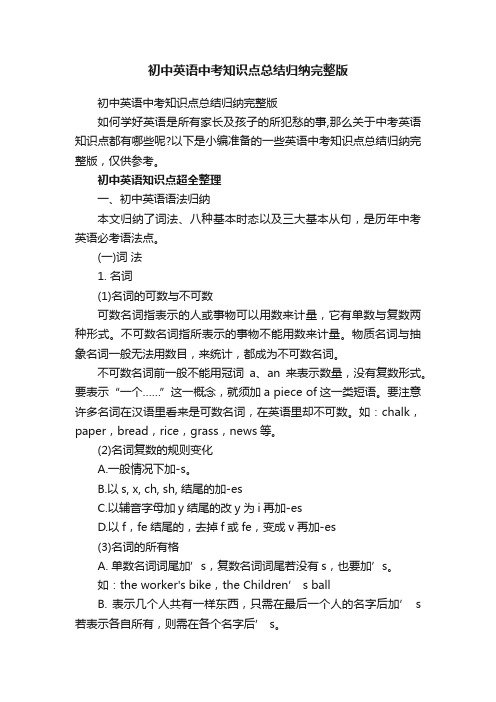
初中英语中考知识点总结归纳完整版初中英语中考知识点总结归纳完整版如何学好英语是所有家长及孩子的所犯愁的事,那么关于中考英语知识点都有哪些呢?以下是小编准备的一些英语中考知识点总结归纳完整版,仅供参考。
初中英语知识点超全整理一、初中英语语法归纳本文归纳了词法、八种基本时态以及三大基本从句,是历年中考英语必考语法点。
(一)词法1. 名词(1)名词的可数与不可数可数名词指表示的人或事物可以用数来计量,它有单数与复数两种形式。
不可数名词指所表示的事物不能用数来计量。
物质名词与抽象名词一般无法用数目,来统计,都成为不可数名词。
不可数名词前一般不能用冠词a、an来表示数量,没有复数形式。
要表示“一个……”这一概念,就须加a piece of这一类短语。
要注意许多名词在汉语里看来是可数名词,在英语里却不可数。
如:chalk,paper,bread,rice,grass,news等。
(2)名词复数的规则变化A.一般情况下加-s。
B.以s, x, ch, sh, 结尾的加-esC.以辅音字母加y结尾的改y为i再加-esD.以f,fe结尾的,去掉f或fe,变成v再加-es(3)名词的所有格A. 单数名词词尾加’s,复数名词词尾若没有s,也要加’s。
如:the worker's bike,the Children’ s ballB. 表示几个人共有一样东西,只需在最后一个人的名字后加’ s 若表示各自所有,则需在各个名字后’ s。
如:This is Lucy and Licy’ s room.These are Kate's and jack’ s rooms.C. 如果是通过在词尾加—s构成的复数形式的名词,只加’。
如:the students’ books,the girls’ blouses(另外:名词+of+名词名词是有生命的,我们就用’s结构来表示所有关系。
如果名词所表示的事物是无生命的,我们就要用名词+of+名词的结构来表示所有关系。
初中英语中考知识点总结大全
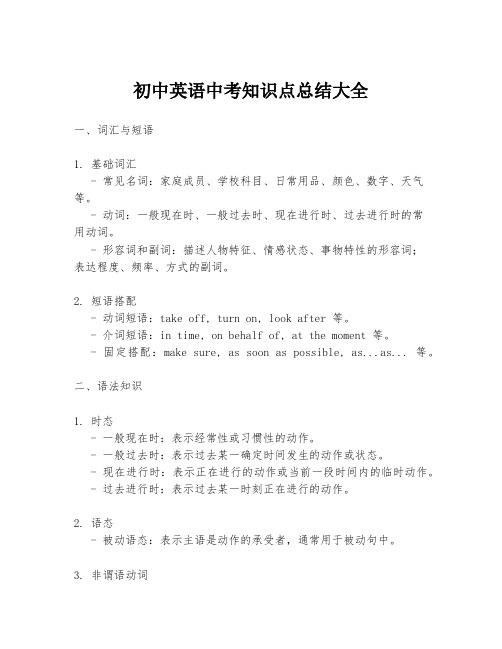
初中英语中考知识点总结大全一、词汇与短语1. 基础词汇- 常见名词:家庭成员、学校科目、日常用品、颜色、数字、天气等。
- 动词:一般现在时、一般过去时、现在进行时、过去进行时的常用动词。
- 形容词和副词:描述人物特征、情感状态、事物特性的形容词;表达程度、频率、方式的副词。
2. 短语搭配- 动词短语:take off, turn on, look after 等。
- 介词短语:in time, on behalf of, at the moment 等。
- 固定搭配:make sure, as soon as possible, as...as... 等。
二、语法知识1. 时态- 一般现在时:表示经常性或习惯性的动作。
- 一般过去时:表示过去某一确定时间发生的动作或状态。
- 现在进行时:表示正在进行的动作或当前一段时间内的临时动作。
- 过去进行时:表示过去某一时刻正在进行的动作。
2. 语态- 被动语态:表示主语是动作的承受者,通常用于被动句中。
3. 非谓语动词- 动名词:作为名词使用,可以作主语、宾语等。
- 分词:现在分词和过去分词,用作形容词或副词。
- 不定式:作为名词、形容词、副词等使用。
4. 情态动词- can/could, may/might, must, should/ought to 等,表示推测、建议、义务等。
5. 代词- 人称代词:主格和宾格。
- 物主代词:形容词性物主代词和名词性物主代词。
- 反身代词、指示代词、疑问代词等。
6. 连词- 并列连词:and, but, or, so 等,连接并列句。
- 从属连词:because, since, although, if 等,引导从句。
7. 句子结构- 简单句:一个主语和一个谓语构成的句子。
- 并列句:由并列连词连接的两个或多个简单句。
- 复合句:包含主句和从句的句子结构。
三、阅读理解1. 快速阅读- 通过标题、图片、首尾段落把握文章大意。
初中英语中考必考知识点

初中英语中考必考知识点一、语法知识(一)名词1. 可数名词与不可数名词可数名词有单复数形式。
复数形式的构成规则有:一般在词尾加 -s,如book books。
以s, x, ch, sh结尾的词加 -es,如box boxes。
以辅音字母 + y结尾的词,变y为i加 -es,如city cities;但以元音字母+y 结尾的词,直接加 -s,如day days。
以f或fe结尾的词,变f或fe为v加 -es,如knife knives,但也有一些词直接加 -s,如roof roofs。
不可数名词没有复数形式,常见的不可数名词有:water, milk, air, food(表示食物的总称时)等。
2. 名词所有格有生命的名词所有格:一般在词尾加's,如Tom's book。
以s结尾的复数名词,只加',如the students' classroom。
表示两者或两者以上共同拥有时,只在最后一个名词后加's;表示各自拥有时,每个名词后都加's。
例如:Lucy and Lily's mother(她们共同的妈妈);Lucy's and Lily's rooms(她们各自的房间)。
无生命的名词所有格常用“of + 名词”结构,如the window of the room。
(二)代词1. 人称代词主格:I, you, he, she, it, we, you, they,在句中作主语。
例如:I like English.宾格:me, you, him, her, it, us, you, them,在句中作宾语。
例如:He helps me.2. 物主代词形容词性物主代词:my, your, his, her, its, our, your, their,后面要接名词。
例如:This is my book.名词性物主代词:mine, yours, his, hers, its, ours, yours, theirs,相当于“形容词性物主代词+名词”。
中考英语知识点总结

中考英语知识点总结中考英语知识点总结在平日的学习中,大家都没少背知识点吧?知识点是传递信息的基本单位,知识点对提高学习导航具有重要的作用。
还在为没有系统的知识点而发愁吗?下面是小编为大家收集的中考英语知识点总结,供大家参考借鉴,希望可以帮助到有需要的朋友。
中考英语知识点总结11.一般现在时的用法1) 经常性或习惯性的动作,常与表示频腮度的时间状语连用。
时间状语:ever…, seties, at…, n SundaI leave he fr schl at 7 ever rning.2) 客观真理,客观存在,科学事实。
The earth ves arund the sun.Shanghai lies in the east f China.3) 表示格言或警句中。
Pride ges befre a fall. 骄者必败。
注意:此用法如果出现在宾语从句中,即使主句是过去时,从句谓语也要用一般现在时。
例:Clubus prved that the earth is rund..4) 现在时刻的状态、能力、性格、个性。
I dn’t第一句用一般现在时,用于操作演示或指导说明的示范性动作,表示言行的瞬间动作。
再如:N4)2) (错) Harr has gt arried fr six ears.= Harr began t get arried six ears ag, and is still getting arried nw.显然,第二句不对,它应改为 Harr gt arried six ears ag. 或 Harr has been arried fr six ears.13. since的四种用法1) since +过去一个时间点 (如具体的年、月、日期、钟点、1980, last nth, half past six)。
I have been here since 1998.2) since +一段时间+ agI have been here since five nths ag.3) since +从句Great changes have taen place since u left.Cnsiderable tie has elapsed since we have been here.4) It is +一段时间+ since从句It is tw ears since I becae a pstgraduate student.被动语态的几种类型1)主语句中有一个宾语的被动语态,如:He saw her in the shp esterda.She was seen in the shp esterda.2) 主语有两个宾语的被动语态Li Lei gave e a cheistr b.I was given a cheistr b b Li Lei.A cheistr b was given t e b Li Lei.3)主动句中含宾语补足语的句子的被动语态若宾语补足语是不带t 的不定式,变为被动语态时,该不定式前要加"t"。
中考英语必背重点知识点总结

中考英语必背重点知识点总结一、语法部分:1.时态的使用:-一般现在时:表示经常性、习惯性的动作或永恒的真理。
-现在进行时:表示现阶段正在进行的动作。
-一般过去时:表示过去一些时间发生的动作或存在的状态。
-过去进行时:表示过去一些时间正在进行的动作。
-现在完成时:表示过去发生的动作与现在的影响或结果。
-过去完成时:表示过去一些时间之前发生的动作或存在的状态。
-将来时:表示将来发生的动作或存在的状态。
2.语态的转换:-主动语态:强调动作的执行者。
-被动语态:强调动作的承受者。
3.动词的变化:- 一般现在时的第三人称单数变化规则:动词直接加-s或-es。
- 动词过去式的变化规则:大部分动词直接加-ed,规则变化的动词需要根据不同的规则进行变化。
- 动词过去分词:表示被动或完成的动作,常常与助动词have, has, had等连用。
4.代词的使用:-主格代词:作主语或主语补语。
-宾格代词:作宾语或介词宾语。
-物主代词:表示所属关系。
-反身代词:强调动作反作用于主语自己。
-指示代词:指示特指或近指的人或物。
-不定代词:表示泛指或不确定的人或物。
5.名词的单复数形式:-一般情况下,名词的复数形式在词尾加-s。
- 以-s, -x, -sh, -ch结尾的名词,复数形式加-es。
- 以辅音字母+y结尾的名词,复数形式将-y变为-ies。
- 以-f或-fe结尾的名词,复数形式将-f或-fe变为-ves。
- 以-o结尾的名词,复数形式加-es。
6.形容词和副词的比较级和最高级:- 一般情况下,形容词和副词的比较级和最高级前加more和most。
- 以-e结尾的形容词,比较级和最高级在词尾加-r和-st。
- 以重读闭音节结尾的单音节或部分双音节形容词,双写词尾字母,再加-er和-est。
-不规则变化的形容词,比较级和最高级用不同词形。
7.特殊句式:- There be句型:表示存在或发生的情况。
- It is + 形容词 + for + 人 + to do:表示对人来说是怎样的。
中考英语全部知识点

常用词组1、be time to+动词原形、be time for+名词:到…….时间了It is time to have lunch = It is time for lunch. 到午餐时间了;2、thank for感谢Thank you for your help;谢谢你的帮助;3、look after 、take care of:照顾、照看I want to look after my sister = I want to take care of my sister. 我要照顾我的妹妹;4、watch out、look out:注意过马路时,要注意小汽车下面两句话意思一样:When you walk across the road,you should watch out the cars.When you walk across the road,you should look out the cars.5、get up起床,go to bed上床睡觉,be late for+名词或动词+ing:迟到If you don’t get up early ,you will be late for school. 如果不早点起床,你上课会迟到;Go to bed early, orotherwise you will be late for school. 早点睡觉,否则你上学会迟到;I was late for playing basketball yesterday. 我昨天打篮球迟到了6、catch up with:赶上If you walk quickly,you can catch up with the bus. 如果你走快点,你就能赶上车; 7、look for寻找,find找到、发现,find out找到了、发现了He is still looking for the Chinese book.他一直在找语文书;I find out the way to learn English. 我发现了学习英语的方法way;8、learn from:向…学习You should learn from Mary. 你们应该向玛丽学习;9、go to school上学,go to work上班,go to the cinema看电影go to hospital去看病,see a doctor去看病,see a film看电影10、in bed卧病在床,in the bed在床上He has a cold,so he stay in bed. 他感冒了,所以他卧病在床;Where is Mary——In the bed. 玛丽在哪里在床上;11、have a walk/take a walk:散步,go for a walk外出散步That old man often has a walk或takes a walkafter watching TV. 那个老人常常在看完电视后去散步He often goes for a walk after supper. 他常常晚饭后外出散步;12、at first首先,开始,at last最后,in order to为了In order to keep us healthy,at first,we should eat more vegetables and fruits,at last,we should do more exercise. 为了保持我们身体健康,首先我们要吃较多的蔬菜和水果,最后我们要多做运动;13、be angry with+人对…人生气,be angry at+物对…事生气The teacher was angry with Mary yesterday. 老师昨天对玛丽很生气;His father was angry at his homework yesterday. 他爸爸昨天对他的作业很生气; 14、be strict with+人对…人严格,be strict at+物对…事严格The teacher is strict with Mary. 老师对玛丽很严格;His father is strict at his homework. 他爸爸对他的作业很严格;15、agree with同意,be bad for对…没有好处,be good for对…有好处I agree with you,smoking is bad for you,doing exercise is good for you. 我同意你,吸烟对你没有好处,做运动对你有好处;16、pick摘,pick up something捡起某物,pick somebody up接某人I am picking the apples. 我正在摘苹果;You should pick up the pen. 你应该捡起笔;I will drive car to pick you up. 明天我将开车去接你;17、solve、work out:解决We have already solved this problem = We have already worked out this problem. 我们已经解决了问题;18、be from、come from:来自I am from China = I come from China. 我来自中国He is from Australia = he comes from Australia. 他来自澳大利亚;19、be interested in对….感兴趣I am interested in cartoon. 我对卡通片感兴趣;My father is interested in movie. 我爸爸对电影感兴趣;20、be good at、do well in:擅长、在某方面做的好He is good at playing basketball = He does well in playing basketball. 他篮球打得好;21、get on well with、get along well with:和……相处得好Mary gets on well with her classmates = Mary gets along well with her classmates.玛丽和她的同学相处得很好22、get on上,get off下、离开He gets on the bus at Clliford. 他在祈福站上车;He gets off the bus at Shiqiao. 他在市桥站下车;23、turn on打开、turn off关掉、turn ….down调小声、turn ….up调大声At first, turn on the computer, at last, turn off the light. 首先开电脑,最后关灯;At first, turn the TV down, at last, turn the cellphone up. 首先调小电视声音,最后调大的声音;24、have a good time/have fun:玩得很高兴They had a good time today = They had fun today. 今天他们玩得很高兴25、laugh at 、make fun of、play a joke on:嘲笑玛丽总是嘲笑史密斯下面三句话意思一样:Mary always laughs at Smith.Mary always makes fun of Smith.Mary always plays a joke on Smith.26、hear from收到来信、keep in touch with保持联系I haven’t heard from Mary for a long time. 我很久没有收到玛丽的来信了;Mary has kept in touch with me for three years. 三年来玛丽一直和我保持联系;27、join in、take part in:参加I will join in the sports meeting next year. 明年我将参加运动会;Mary took part in the sports meeting last year. 去年玛丽参加了运动会;28、keep ..from doing、stop ..from doing、prevent ..from doing:阻止….做…..我们要阻止一些人污染水下面三句话意思一样:We should keep some people from polluting water.We should stop some people from polluting water.We should prevent some people from polluting water.29、put on穿上、take off脱下Take off the coat,and then put on T-shirt.30、come true成真、实现、give up放弃Keep going,and your dream will come true. 坚持,你的梦想就会成真;He never gives up learning English. 他从来没有放弃学习英语;31、have to不得不、go to sleep去睡觉、fall asleep睡着了、wake up醒来、I am sleepy,I have to go to sleep. 我很困,我不得不去睡觉;Last night,when he came back home,his son fell asleep. 昨晚,当他回到家时,他的儿子睡着了Mary often wakes up at six in the morning. 玛丽通常在早上六点醒来32、in fact事实上、prefer A to B与B相比更喜欢AIn fact,I prefer the apples to the pears. 事实上,与雪梨相比我更喜欢苹果;I prefer playing football to playing basketball. 与打篮球相比我更喜欢踢足球;In fact,I prefer to play basketball. 事实上,我更喜欢打篮球;33、make sure确信、in the future将来I make sure we will have much cleaner water in the future. 我确信将来我们拥有更干净的水;33、be full of充满…、be filled with被…填满、fill with用…填The bottle is full of water. 瓶子装满了水;The bottle is filled with water. 瓶子被水填满;Mary is filling the bottle with water;玛丽正在把水装入瓶子;34、be made of由…制成——看得到原材料,be made from由…制成——看不得到原材料This chair is made of wood. 这张椅子是由木头制成;Paper is made from wood. 纸是由木头制成;35、grow up长大、make friends with和…交朋友、all over the world全世界When he grows up,he will make friends with people from all over the world. 当他长大的时候,他将和来自全世界的人交朋友;36、get used to doing习惯于做某事、be used to doing习惯于做某事他习惯于晚饭后去散步下面两句话意思一样:He gets used to going for a walk after supper.He is used to going for a walk after supper.37、in my opinion依我看、have a rest休息一下、take a rest休息一下依我看,你们所有人太累了,你们应该休息一下下面两句话意思一样:In my opinion,you all are so tired,you should have a rest.In my opinion,you all are so tired,you should take a rest.38、what’s more而且,更重要的是I like summer. In summer, I can eat ice cream,wear T-shirt. What’s more, I can go swimming.我喜欢夏天,在夏天我可以吃冰淇淋、穿T恤,更重要的是我可以去游泳;39、be worried about、worry about:担心玛丽总是担心英语考试下面两句话意思一样:Mary is always worried about the English exam.Mary always worrys about the English exam.40、such as例如——不用逗号分开、for example例如——要用逗号分开玛丽有很多衣服,例如:寸衫、裙子、T恤、上衣下面两句话意思一样:Mary has many clothes such as blouse, skirt, T-shirt, coat;Mary has many clothes, for example, blouse, skirt, T-shirt, coat;41、used to过去常常、tell jokes讲笑话Mary used to tell jokes to me = Mary used to tell me jokes. 玛丽过去常常讲笑话给我听;42、set up建立,创立、set off出发——常常和for连起来用In order to help those people who want to play football,they want to set up a football club;为了帮助想踢足球的人,他们要建立一个足球俱乐部;What time will you set off tomorrow. 你明天什么时候出发;He set off for Beijing just now. 他刚刚出发去北京;42、set out开始、着手——后接to do、set about开始、着手——后接doing他昨天开始学英语下面两句话意思一样:He set out to learn Chinese yesterday.He set about learning Chinese yesterday.43、prepare for准备Look,he is preparing for breakfast. 看,他正在准备早餐;44、instead of代替We like learning instead of playing = Instead of playing, we like learning .我们喜欢学而不是玩;45、take place举行、发生——不能用于被动语态、hold举行、拥抱The meeting will take place next Friday = The meeting will be held next Friday;会议将在下星期五举行;Great changes have taken place in China;中国发生了许多变化;连词1、both A and B两者都,look forward to期待Both you and he like skating. 你和他都喜欢滑冰;Both Mary and Smith look forward to your good news.玛丽和斯密斯都期待你的好消息;Both you and me look forward to hearing from Mary. 你和我都期待收到玛丽的来信;注意:look forward to +名词或动词+ing2、neither A nor B 既不…..也不…..Neither you nor he likes skating. 你不喜欢滑冰,他也不喜欢滑冰;Mary likes neither skating nor swimming. 玛丽既不喜欢滑冰,也不喜欢游泳;He runs neither fast nor steadily稳固. 他跑得既不快也不稳;He is neither tall nor handsome. 他既不高也不英俊;3、Either A or B要么…..要么…..、或者…..或者…..Either you or he likes skating. 要么你喜欢滑冰,要么他喜欢滑冰;Mary likes either skating or swimming. 玛丽要么喜欢滑冰,要么喜欢游泳;He runs either fast or slowly.他跑得要么快要么慢;He is either a fool or a smart boy.他要么是个笨蛋,要么是个聪明娃;4、not only A but also B 不仅…..而且…..Not only you but also he likes skating.不仅你喜欢滑冰,而且他也喜欢滑冰;Mary likes not only skating but also swimming.玛丽不仅喜欢滑冰,而且喜欢游泳;He runs not only fast but also steadily稳固.他跑得不仅快而且稳;He is not only tall but also handsome.他不仅高而且英俊;5、So+形容词+that 如此…..已致…..Your English teacher is so kind that everyone likes her.你们的英语老师是如此的善良,以致每个人读喜欢她;Mary is so tall that she can reach the apple.玛丽是如此的高,以致能够得着苹果;6、such..that 如此…..已致…..1such+a/an+形容词+可数名词单数+thatYour English teacher is such a kind woman that everyone likes her. 你们的英语老师是如此的善良,以致每个人读喜欢她.Mary is such a tall girl that she can reach the apple.玛丽是如此的高,以致能够得着苹果; 2such+形容词+可数名词复数+thatYour teachers are such kind women that everyone likes them;你们的老师是如此的善良,以致每个人都喜欢她们;7、too..to 太….而不能…..Mary is too short to reach the apple;玛丽太矮了够不着苹果;8、enough..to 足够….可以…..:形容词+enough to,enough+名词toMary is tall enough to reach the apple.玛丽足够高可以够得着苹果;I have enough time to finish homework.我有足够的时间来完成作业;We have enough apples to satisfy the hungry people.我们有足够的苹果来满足饥饿的人;9、not..until 直到….才….We won’t leave until you come back.直到你们回来我们才离开;Mary didn’t go to bed until her mother came back home yesterday.玛丽昨晚直到她妈妈回到家才上床睡觉Mary doesn’t go to bed until her mother comes back home everyday.每天玛丽直到她妈妈回到家才上床睡觉10、so that 以便….He works hard so that he can earn much money.他工作很努力以便赚更多的钱;Mary studied hard last night so that she can pass the exam.玛丽昨晚很努力学习,以便通过考试;11、in order to 为了….He works hard in order to earn much money.为了赚更多的钱,他工作很努力;Mary studied hard last night in order to pass the exam.为了通过考试,玛丽昨晚很努力学习;12、as..as 像….一样He is as smart as I.他像我一样聪明Your house is as beautiful as mine.你的房子像我的一样漂亮;13、As long as 只要You can earn much money as long as you work hard. 只要你努力工作,你就能赚更多的钱He will pass the exam as long as he studies hard. 只要他努力学习,他就会通过考试;形式主语it1、It is形容词+to+doIt is easy to finish Maths homework. 很容易完成数学作业;It is important to do exercise. 做运动很重要;2、It is +名词+to+doIt is my pleasure to help you. 帮助你我很快乐;It is a pity to miss错过the bus. 很可惜错过巴士;3、It is形容词+for+ somebody +to+doIt is easy for me to finish Maths homework. 对我来说完成数学作业太简单;It is important for Mary to do exercise. 对玛丽来说做运动很重要;4、It is形容词+of + somebody +to+do形容词必须是表达“品性”的形容词,如:kind善良的、友好的、nice友好的、friendly 友好的、wise英明的、polite有礼貌的、impolite无礼的、rude粗鲁、foolish愚蠢的、smart 聪明的、clever聪明的、cruel残忍的、brave勇敢的、silly愚蠢的等;It is very kind of you to help old people. 你很善良,帮助老人;It is polite of him to give the seat to sick people. 他很有礼貌,把位置让给病人;It is smart of them to work out this problem. 他们很聪明,解决了问题;5、人+find+it+形容词+to+doI find it easy to finish Maths homework. 我发现很容易完成数学作业;Mary found It important to do exercise. 玛丽发现做运动很重要;花费句型1、It take somebody +时间+to+do 某人花费多少时间做……It takes him 20 minutes to go to school everyday. 他每天上学要花20分钟;It took Mary 2 hours to go shopping yesterday.玛丽昨天花了2小时购物;It took me 2 hours to do homework yesterday.我昨天花了2小时做作业;2、It cost somebody +钱+to+do 某人花费多少钱做……It cost him 20 dollars to buy this shirt.他花了20美元买这件寸衫;It will cost me 8 dollars to buy a brush-pen tomorrow.明天我将要花8美元买一只毛笔;3、物+ cost somebdoy +钱某物花费某人多少钱This brush-pen cost me 8 dollars.这只毛笔花了我8美元4、1人+ spend+时间钱+on sth 某件事情花费某人多少时间或钱Mary spends 2 hours on homework everyday. 玛丽每天花2小时做作业;I spent 8 yuan on this brush-pen yesterday. 我昨天花了8元买这只毛笔;2人+ spend+时间钱+in doing sth做某件事情花费某人多少时间或钱Mary spends 2 hours in doing homework everyday. 玛丽每天花了2小时做作业I spent 8 dollars in buying this brush-pen yesterday. 我昨天花了8美元买这只毛笔感叹句型1、how +形容词缩写:How bad.多么坏扩展:How bad the weather is. 天气是多么的坏How bad the boy is.这个男孩是多么的坏缩写:how silly. 多么愚蠢扩展:How silly he is. 他是多么的愚蠢How silly the dog is.这只狗是多么的愚蠢2、1what a/an+形容词+可数名词单数缩写:What a handsome boy. 多么英俊的一个男孩;扩展:What a handsome boy he is. 他是多么英俊的一个男孩;缩写:What an interesting story. 多么有趣的一个故事;扩展:What an interesting story it is. 这是多么有趣的一个故事; 2what +形容词+可数名词复数缩写:What beautiful girls. 多么漂亮的女孩子们扩展:What beautiful girls they are. 她们是多么漂亮的女孩子; 3what +形容词+不可数名词缩写:What fresh milk. 多么新鲜的牛奶;扩展:What fresh milk it is. 这是多么新鲜的牛奶;缩写:What clean water. 多么干净的水;扩展:What clean water it is. 这是多么干净的水;。
初三英语必背知识点归纳总结
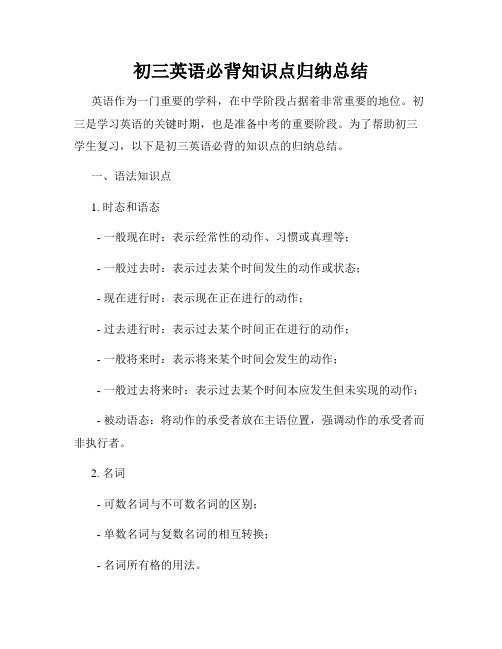
初三英语必背知识点归纳总结英语作为一门重要的学科,在中学阶段占据着非常重要的地位。
初三是学习英语的关键时期,也是准备中考的重要阶段。
为了帮助初三学生复习,以下是初三英语必背的知识点的归纳总结。
一、语法知识点1. 时态和语态- 一般现在时:表示经常性的动作、习惯或真理等;- 一般过去时:表示过去某个时间发生的动作或状态;- 现在进行时:表示现在正在进行的动作;- 过去进行时:表示过去某个时间正在进行的动作;- 一般将来时:表示将来某个时间会发生的动作;- 一般过去将来时:表示过去某个时间本应发生但未实现的动作;- 被动语态:将动作的承受者放在主语位置,强调动作的承受者而非执行者。
2. 名词- 可数名词与不可数名词的区别;- 单数名词与复数名词的相互转换;- 名词所有格的用法。
3. 代词- 人称代词、物主代词、反身代词的用法;- 指示代词和疑问代词的用法。
4. 形容词和副词- 形容词和副词的基本用法;- 比较级和最高级的构成方式;- 不规则比较级和最高级的形式;- 形容词和副词的修饰范围。
5. 介词和介词短语- 常见的介词及其用法;- 介词短语在句子中的作用。
6. 动词- 不同类型动词的用法,包括实义动词、系动词、情态动词等; - 动词的时态和语态。
7. 数词和量词- 基数词和序数词的用法;- 量词的用法。
8. 并列连词和从属连词- 并列连词的分类和用法;- 从属连词的分类和用法。
9. 特殊句型- 倒装句的形式和用法;- 感叹句的形式和用法;- 条件句和虚拟语气的用法;- 宾语从句和主语从句的用法;- 直接引语和间接引语的转换。
二、词汇知识点1. 同义词和反义词- 同义词:指意义相同或相近的词语;- 反义词:指意义相反的词语。
2. 高频词汇- 常见的高频词汇,包括常用动词、形容词、副词、名词等; - 常用短语和固定搭配。
三、阅读技巧1. 阅读理解题- 不同类型的阅读题目,包括事实细节、主旨大意、推理判断等; - 阅读题目的解题技巧和答题方法。
中考英语必考知识点

中考英语必考知识点一、动词词组(包括短语动词)、介词词组和其他词组(一)1.由be构成的词组be good at 善于,擅长于 be careful of 当心,注意,仔细be covered with 被……复盖 be ready for 为……作好准备be surprised (at) 对……感到惊讶 be interested in 对……感到举be on 在进行,在上演, (灯)亮着be able to do sth. 能够做… be angry with sb. 生(某人)的气be pleased (with) 对……感到高兴(满意)be strict in (with) (对工作、对人)严格要求be from 来自……,什么地方人 be worried 担忧be covered with 被……所覆盖…… be in trouble 处于困境中 be made of (from) 由……制成be satisfied with 对……感到满意 be free 空闲的,有空be (ill) in bed 卧病在床 be glad to do sth. 很高兴做……be late for ……迟到2ee back 回来 e on 快,走吧,跟我来加油 5)e out出来出版e up 上来 e from 来自……3.dodo more speaking/reading 多做口头练习/朗读 doone's best 尽力do some shopping (cooking reading, cleaning)买东西(做饭菜,读点书,大扫除)do morning exercises 做早操do eye exercises 做眼保健操 do well in 在……某方面干得好4.get1)get ready for (=be ready for) 为……作好准备2)get on (well) with 与…相处(好)3)get back 返回 4)get rid of 除掉,去除 5)get in 进入,收集6)get on/off 上/下车 7)get to 到达 8)get there 到达那里5.give1)give sb. a call 给……打电话 2)give a talk 作报告3)give a lecture (a piano concert)作讲座(举行钢琴音乐会)4)give back 归还,送回5)give……some advice on 给……一些忠告6)give lessons to 给……上课 7)give in 屈服 8)give up 放弃9) give sb. a chance 给……一次机会6.go1)go ahead 先走,向前走,去吧,干吧 2)go to the cinema 看电影 3)go to bed 睡觉4)go to school (college) 上学(上大学) 5)go to (the) hospital 去医院看病6)go over 复习/ go over to 朝……走去7)go fishing/skating/swimming/shopping 去钓鱼/滑冰/游泳/买东西8)go home (there) 回家去(去那儿) 9)go round 顺便去,绕道走10)go up 上去 11)go out for a walk 外出散步12)go on (doing) 继续(做……)13)go upstairs/downstairs 上/下楼 14)(the lights) go out (灯)熄了7. havehave a football match (basketball match) 举行一场足球(蓝球)赛have a try 试一试 have a good/wonderful time 玩得很高兴 have a report (talk) on 听一个关于……的报告have breakfast/lunch/supper 吃早饭/午饭/晚饭have a meal (three meals) 吃一顿饭(三餐饭) have (have got) a headache 头痛have a fever 发烧have a cough (a cold) 咳嗽(感冒) have a look (at) 看一看……have a rest (a break) 休息一会儿(工间或课间休息) have a talk 谈话have a swim/walk 游泳/散步 have a sports meet (meeting) 开运动会 have something done 让人(请人)做……have a word with 与……谈几句话8.helphelp sb. with sth. help sb. do sth. 在……方面帮助…… 帮助……做help each other 互相帮助9.keep1)keep up with 跟上……,不落后于……2)keepsilent/quiet 保持沉默/安静3)keep sb. doing sth. 使……一直做……4)keep one's diary 记日记10.make1)make a noise (a lot of noise, much noise, noises)吵闹(十分嘈杂,响声)2)make a living 谋生 3)make sb. do sth. 让某人做……4)make faces (a face)做鬼脸5)make friends (with)与……交朋友 6)make a mistake (mistakes)犯错误7.make room/space for 给…腾出地方 8.make a sentence (sentences)with 用……造句9)make a fire 生火11.look1)look out of (outside) 往外看(看外面) 2)look up a word (in the dictionary) 3)look up 往上看,仰望 4)look after 照管,照看,照顾5)look for 寻找6)look like 看上去像7)look fine/well/tired/worried 看起来气色好/健康/疲劳/忧虑8)look out 当心,小心 10)look around 朝四周看11)look at 看着……12.put1)put on 穿上(衣服),戴上(帽子),上演(戏剧) 2)put up 建造,搭起,挂起,举起,张帖 4)put one's heart into 全神贯注于 put away 把…放好 put off 推迟 put out 灭火5)put…down… 把……放下13.set1)set up 竖起,建起 3)set out 出发3.)set an example for 为……树立榜样14.take1)take one's advice 听从某人劝告2)take out 拿出,取出3)take down 拿下4)take place 发生5)take one's place 坐……的座位,代替某人职务6)take the place of 代替……7)take a walk/rest 散步/休息8)take it easy 别紧张9)take care of 关心/照顾/保管10)take away 拿走 11)take off 脱下(衣,帽,鞋等)拿掉12)take (an active) part in (积极)参加(活动13)take photos 拍照14)take some medicine 服药 15)take a bus/train, boat/ 乘公共汽车,火车/船15.turn1)turn on 开,旋开(电灯,收音机等) 2)turn off 关上(电灯,收音机等)3)turn in 交出,上交 4)turn down (把音量)调低5)turn…over 把……翻过来重点句型1.I think…意为“我认为……”,是对某人或某事的看法或态度的一种句型。
中考英语必考知识点

中考英语必考知识点一、词汇1.数字:数词、序数词、基数词、小数、分数等。
2.动词:时态、语态、非谓语动词(动词不定式、动名词、分词)、不规则动词等。
3.名词:单复数、可数不可数名词、所有格等。
4.形容词和副词:基本形容词和副词的比较级和最高级形式、形容词修饰的名词、副词修饰的动词、能够修饰形容词和副词的比较结构等。
5.连词:连词的种类、用法及连接词语的句子等。
6.代词:人称代词、指示代词、反身代词等。
7.冠词:冠词的种类、用法及其词组等。
8.介词:基本介词及其意义及用法、词组等。
9.情态动词:情态动词的种类、用法及其词组等。
10.疑问句:特殊疑问句、一般疑问句、选择疑问句等。
11.否定句:否定句的构成、否定词的位置等。
12.句子的基本成分:主语、谓语、宾语、表语、定语、状语等。
13.句型:陈述句、祈使句、感叹句、特殊疑问句、条件句、比较句等。
二、语法1.时态:一般现在时、一般过去时、一般将来时、现在进行时、过去进行时、将来进行时、现在完成时、过去完成时等。
2.语态:主动语态、被动语态。
3.非谓语动词:动词不定式、动名词、现在分词、过去分词的形式和用法。
4.名词性从句:主语从句、宾语从句、表语从句、同位语从句等。
5.定语从句:限制性定语从句、非限制性定语从句等。
6.状语从句:条件状语从句、时间状语从句、原因状语从句、方式状语从句、结果状语从句等。
7.并列句:并列句的连接及词组等。
8.书面表达:书信、应用文、记叙文、描写文、议论文、说明文等。
三、听力1.录音材料:记笔记、填空、选择等。
2.各种对话:日常交流、购物、问路、订酒店、预约、介绍、感叹等。
3.各种情景对话:图画、短文、故事等。
四、阅读理解4.夹叙夹议:根据短文内容综合归纳、评述、解释等。
五、写作1.书信:常见的书信格式、内容及写作要点等。
2.对话:场景对话、日常对话、情景对话等。
3.日记:时间、地点、人物、事件、感受等。
中考英语知识点全汇总
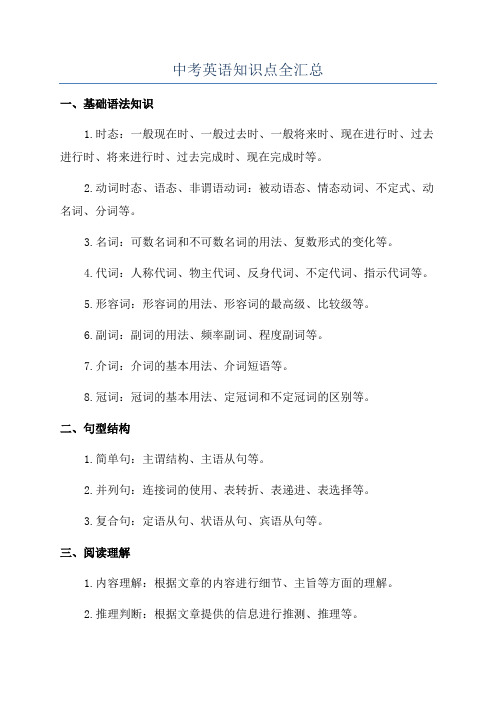
中考英语知识点全汇总一、基础语法知识1.时态:一般现在时、一般过去时、一般将来时、现在进行时、过去进行时、将来进行时、过去完成时、现在完成时等。
2.动词时态、语态、非谓语动词:被动语态、情态动词、不定式、动名词、分词等。
3.名词:可数名词和不可数名词的用法、复数形式的变化等。
4.代词:人称代词、物主代词、反身代词、不定代词、指示代词等。
5.形容词:形容词的用法、形容词的最高级、比较级等。
6.副词:副词的用法、频率副词、程度副词等。
7.介词:介词的基本用法、介词短语等。
8.冠词:冠词的基本用法、定冠词和不定冠词的区别等。
二、句型结构1.简单句:主谓结构、主语从句等。
2.并列句:连接词的使用、表转折、表递进、表选择等。
3.复合句:定语从句、状语从句、宾语从句等。
三、阅读理解1.内容理解:根据文章的内容进行细节、主旨等方面的理解。
2.推理判断:根据文章提供的信息进行推测、推理等。
3.表达能力:根据文章的要求进行写作、归纳总结等。
四、口语表达1.询问:询问信息、询问意见等。
2.辩论:陈述自己的观点、提出理由等。
3.请求:请求帮助、请求许可等。
4.提醒:提醒他人注意事项、提醒日程安排等。
5.道歉:道歉表达、解释原因等。
五、写作技巧1.写作表达:书信写作、日记写作、演讲稿写作等。
2.句子表达:句子的连贯性、句子的多样性等。
3.表达方式:使用形容词、副词、比喻、排比等方式进行表达。
4.逻辑结构:文章段落的开头、结尾、过渡等。
六、听力技巧1.理解题目:理解题干的意思、答题要求等。
2.抓关键词:抓住关键词帮助理解听力材料。
3.预测猜测:根据题干的提示预测可能听到的内容。
4.注意视听:注意听力材料中的重要信息、时间、地点等。
七、词语运用1.同义词、反义词的辨析。
2.词组的搭配。
3.词义的辨析。
八、语篇搭配1.对话:问答形式、交际用语等。
中考所有英语知识点归纳

中考所有英语知识点归纳一、单词拼写1. 名词复数形式的构成规则,如box—boxes2. 形容词比较级与最高级的构成规则,如big—bigger—biggest3. 动词的过去式与过去分词的构成规则,如go—went—gone4. 动词第三人称单数形式的构成规则,如watch—watches5. 动词-ing形式的构成规则,如swim—swimming6. 词根词缀法拼写单词,如telephone, impossible二、时态1. 一般现在时、现在进行时、一般过去时、过去进行时、一般将来时、现在完成时的构成和用法2. 过去将来时、过去完成时的用法三、名词1. 可数与不可数名词2. 计量名词的用法3. 名词所有格的构成规则,如Tom的书4. 名词的单复数变化规则四、代词1. 人称代词的主格和宾格形式2. 物主代词的形式和用法,如mine, yours3. 反身代词的形式和用法,如myself, yourself4. 不定代词的形式和用法,如some, any, every, each, both, either, neither五、形容词和副词1. 形容词的位置和用法,如a big house, a nice girl2. 比较级和最高级的构成和用法,如taller, the tallest3. 副词的用法,如slowly, fast六、动词1. 不规则动词的变化规则,如go—went—gone2. 动词的短语形式,如look after, take off3. 动词不定式的形式和用法,如to go, go shopping4. 动词的时态和语态变化,如is going to do, was done5. 动名词的构成和用法,如swimming, enjoy swimming七、时态和语态1. 一般现在时、一般过去时、一般将来时、现在进行时、过去进行时、过去将来时、现在完成时、过去完成时的构成和用法2. 被动语态的构成和用法,如The book is written by Tom.3. 完成时态与被动语态的综合运用八、介词1. 常用介词的用法,如in, on, at2. 特殊介词的用法,如into, through, between九、连词1. 并列连词的用法,如and, but, or2. 引导从句的连词,如when, if, because十、冠词1. 定冠词和不定冠词的用法,如a book, an apple, the sun2. 特指某人某物的用法,如the girl, the car3. 不用冠词的情况,如go to school, at home十一、句式1. 肯定句、否定句、一般疑问句、特殊疑问句的基本结构和用法2. 直接引语和间接引语的转换,如He said, "I am happy." → He said that he was happy.3. 各种句式在实际交际中的综合运用以上是中考英语知识点的一个大致归纳,希望对你有所帮助。
中考英语知识点归纳汇总-详细
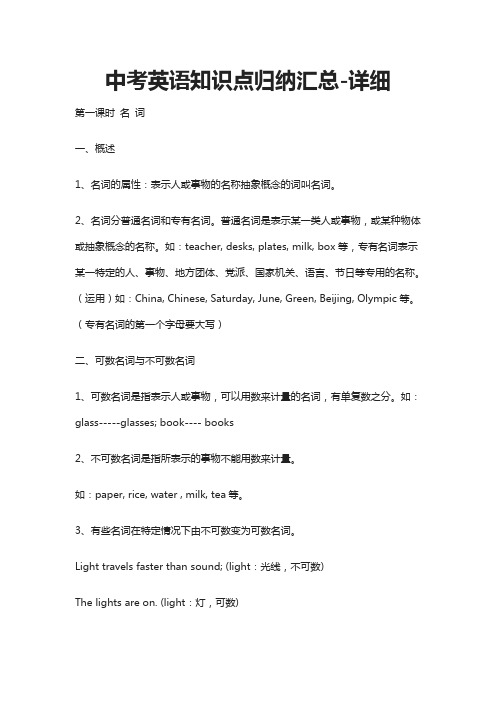
中考英语知识点归纳汇总-详细第一课时名词一、概述1、名词的属性:表示人或事物的名称抽象概念的词叫名词。
2、名词分普通名词和专有名词。
普通名词是表示某一类人或事物,或某种物体或抽象概念的名称。
如:teacher, desks, plates, milk, box等,专有名词表示某一特定的人、事物、地方团体、党派、国家机关、语言、节日等专用的名称。
(运用)如:China, Chinese, Saturday, June, Green, Beijing, Olympic等。
(专有名词的第一个字母要大写)二、可数名词与不可数名词1、可数名词是指表示人或事物,可以用数来计量的名词,有单复数之分。
如:glass-----glasses; book---- books2、不可数名词是指所表示的事物不能用数来计量。
如:paper, rice, water , milk, tea等。
3、有些名词在特定情况下由不可数变为可数名词。
Light travels faster than sound; (light:光线,不可数)The lights are on. (light:灯,可数)4、不可数名词的量的表示不可数名词一般无法用数来计算,前面不能用a或an或数词来表示数量,它的量往往借助于容器来表示。
如:a glass of milk ------ four glasses of milka piece of paper------two pieces of papera bag of rice------three bags of rice三、可数名词的复数形式(识记、运用)1、可数名词在应用时有单复数之分,单数变复数有规则变化和不规则变化两种。
规则变化情况变化形式例词一般情况加-sgirls; books;以s,x,ch,sh结尾的名词加-esclasses; boxes; watches;brushes以辅音字母加y结尾的名词变y为i, 加escity---cities; baby---babies以f或fe结尾的名词变f,fe为v, 加esknife---knives; leaf---leaves以O结尾的名词potatoes; tomatoes;photos; kilos; bamboos; radios 2、少数名词有不规则的变化形式policeman---policemen; man---men; woman---women; tooth---teeth; foot---feet; sheep---sheep; deer---deer; Japanese--- Japanese; Chinese --- Chinese; fish --- fish 四、名词所有格(运用)名词的所有格是表示所有关系的形式,它也有构成上的变化。
中考英语知识点总结归纳完整版
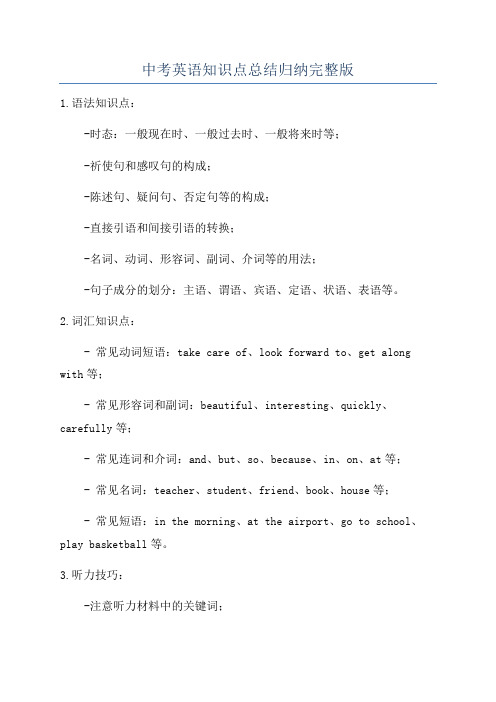
中考英语知识点总结归纳完整版1.语法知识点:-时态:一般现在时、一般过去时、一般将来时等;-祈使句和感叹句的构成;-陈述句、疑问句、否定句等的构成;-直接引语和间接引语的转换;-名词、动词、形容词、副词、介词等的用法;-句子成分的划分:主语、谓语、宾语、定语、状语、表语等。
2.词汇知识点:- 常见动词短语:take care of、look forward to、get along with等;- 常见形容词和副词:beautiful、interesting、quickly、carefully等;- 常见连词和介词:and、but、so、because、in、on、at等;- 常见名词:teacher、student、friend、book、house等;- 常见短语:in the morning、at the airport、go to school、play basketball等。
3.听力技巧:-注意听力材料中的关键词;-学会通过语境猜测单词或句子的含义;-练习听力材料,培养听力技巧;-注意听力材料中的谁在说话,对话中涉及的时间、地点、人物等信息。
4.阅读技巧:-集中注意力,全面理解文章的主旨;-注意文章的结构,抓住重点信息;-养成查字典和阅读长难句的习惯;-利用文章中的标点符号和图片等辅助理解。
5.写作技巧:-根据提纲或要求进行写作;-注意时态和语法的正确运用;-按照逻辑,合理组织文章的结构;-使用恰当的过渡词和连接词来连接句子和段落。
6.口语表达:-多进行口语练习,提高口语表达能力;-学会使用一些常用口语表达,如问候、道歉、感谢等;-注意语音语调的准确使用,避免重音和发音错误;-学会用简单明了的语言来表达自己的观点和观察。
7.语言文化:-学习英语国家的文化习俗和传统;-学习一些英语国家的历史和风景名胜;-了解英语国家的重要节日和庆祝活动;-学习英语国家的主要宗教和节日习俗。
中考英语考试涉及到的知识点比较广泛,以上总结的内容是其中的一部分。
中考英语知识点
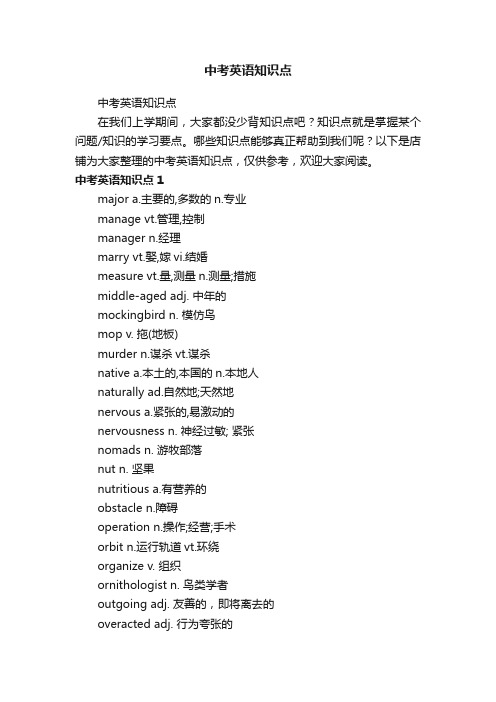
中考英语知识点中考英语知识点在我们上学期间,大家都没少背知识点吧?知识点就是掌握某个问题/知识的学习要点。
哪些知识点能够真正帮助到我们呢?以下是店铺为大家整理的中考英语知识点,仅供参考,欢迎大家阅读。
中考英语知识点1major a.主要的,多数的n.专业manage vt.管理,控制manager n.经理marry vt.娶,嫁vi.结婚measure vt.量,测量n.测量;措施middle-aged adj. 中年的mockingbird n. 模仿鸟mop v. 拖(地板)murder n.谋杀vt.谋杀native a.本土的,本国的n.本地人naturally ad.自然地;天然地nervous a.紧张的,易激动的nervousness n. 神经过敏; 紧张nomads n. 游牧部落nut n. 坚果nutritious a.有营养的obstacle n.障碍operation n.操作;经营;手术orbit n.运行轨道vt.环绕organize v. 组织ornithologist n. 鸟类学者outgoing adj. 友善的,即将离去的overacted adj. 行为夸张的中考英语知识点2当分针所指的时间大于0分、小于等于30分钟时,用"分钟"past"小时"。
例如:8:23--twenty-threepasteight当分针所指的时间大于30分钟、小于60分钟时,用"剩余的时间"to"下一个整点"。
例如:8:49--eleventonine当然,还可以直接按照小时、分钟去读出时间,例如:8:23--eighttwenty-three;8:49--eightforty-nine整点则在数词后加"-oclock",例如:8:00--eightoclock在钟点前介词要用at.中考英语知识点31、副词的种类(1)时间副词如:ago, before, already, just, now, early, late, finally, tomorrow等(2)地点副词如:here, there, near, around, in, out, up, down, back, away, outside等。
初中中考所有的英语知识点(汇总大全)

初中中考所有的英语知识点(汇总大全)初中中考所有的英语知识点代词人称代词,物主代词,反身代词类别主格宾格形容词性物主代词名词性物主代词反身代词第一人称单数I me my mine myself复数 we us our ours ourselves第二人称单数 you you your yours yourself复数 you you your yours yourselves第三人称单数 he him his his himselfshe her her hers herselfit itits its itself复数 they them their theirs themselves1.人称代词人称代词it的特殊用法:一般it指“它”,但在表示天气、时间、距离等时,用it来代替,此时的it并不译为“它”。
当三个人称代词(单数)同时出现时,其先后顺序为you,he,I。
而复数一般采用we,you,they顺序。
2.物主代词物主代词的用法:形容词性物主代词后面一定要跟上一个名词。
名词性物主代词可作主语、表语、宾语。
3.反身代词1)反身代词的构成分两种:第一、二人称反身代词在形容词:性物主代词后加上self或selves,第三人称的反身代词在宾格代词后加上self或selves.2)反身代词的用法:一种是作宾语,由主语发出的动作又回到动作者本身。
如:I enjoyed myself at the party.另一种是作名词或代词的同位语;用来加强语气。
如:I can do it myself.初中中考所有的英语知识点梳理主要不定代词的用法:(1)one的用法A. one作为代词可以指人,也可以指物。
B. one,ones (one的复数形式) 可用来代替前面出现过的少数名词,以避免重复。
C. one的前面可用this,that,the,which等词来修饰。
D. 常有a+形容词+one这一形式。
it和one的用法区别:it用来指特定的东西,而one则用于替代不特定的东西。
中考初中英语知识点总结(大全)
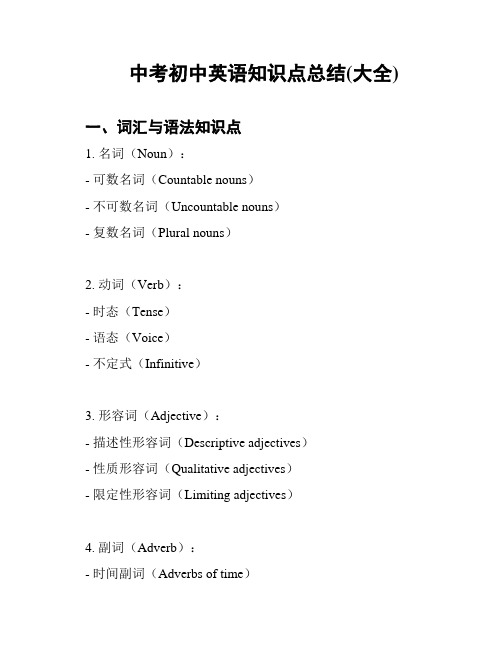
中考初中英语知识点总结(大全)一、词汇与语法知识点1. 名词(Noun):- 可数名词(Countable nouns)- 不可数名词(Uncountable nouns)- 复数名词(Plural nouns)2. 动词(Verb):- 时态(Tense)- 语态(Voice)- 不定式(Infinitive)3. 形容词(Adjective):- 描述性形容词(Descriptive adjectives)- 性质形容词(Qualitative adjectives)- 限定性形容词(Limiting adjectives)4. 副词(Adverb):- 时间副词(Adverbs of time)- 地点副词(Adverbs of place)- 方式副词(Adverbs of manner)5. 介词(Preposition):- 时间介词(Prepositions of time)- 地点介词(Prepositions of place)- 方式介词(Prepositions of manner)6. 连词(Conjunction):- 并列连词(Coordinating conjunctions)- 从属连词(Subordinating conjunctions)7. 代词(Pronoun):- 人称代词(Personal pronouns)- 物主代词(Possessive pronouns)- 反身代词(Reflexive pronouns)二、阅读理解技巧与策略1. 理解文章大意:- 主题句(Topic sentence)- 段落大意概括- 文章标题与上下文关系2. 找寻关键信息:- 关键词查找- 定位词语- 同义替换3. 推断猜测:- 从上下文推断词义- 推断作者观点- 推测故事情节4. 理解语言风格与修辞手法:- 比喻与隐喻- 夸张与反语- 概括与具体三、写作技巧与注意事项1. 作文结构:- 开头(Introduction)- 中间段落(Body paragraphs)- 结尾(Conclusion)2. 句型多样化:- 否定句与疑问句- 同位语从句- 状语从句3. 时态与语态运用:- 一般现在时(Simple present tense)- 过去进行时(Past continuous tense)- 被动语态(Passive voice)4. 单词拼写与语法错误:- 重点单词拼写- 语法错误纠正以上是中考初中英语知识点的总结,希望能对您的备考有所帮助!。
- 1、下载文档前请自行甄别文档内容的完整性,平台不提供额外的编辑、内容补充、找答案等附加服务。
- 2、"仅部分预览"的文档,不可在线预览部分如存在完整性等问题,可反馈申请退款(可完整预览的文档不适用该条件!)。
- 3、如文档侵犯您的权益,请联系客服反馈,我们会尽快为您处理(人工客服工作时间:9:00-18:30)。
2019
过去将来时
过去将来时由would, was/were going to, was/were to was/were about to等加动词原形构成,也可由was/were on the point of加动名词构成。
例句:
I knew you would agree.我知道你会同意的。
I said I would arrange everything.我说我来安排一切。
一般将来时
由will 加动词原形构成,当主语是第一人称时,也可以用shall 加动词原形。
例如:
Telephone me this evening. I’ll be at home.今晚给我打电话,我会在家。
I’ll (shall/will) do a better job next time.下次我要干得好些。
The car won’t start.车开不了啦。
Oil and water will not mix.油和水没法混在一起。
求救和恐惧Calling for help and fear
①Help!救命啊!
②What’s the matter,Granny ?出什么事啦,老奶奶?
③How terrible!多么恐怖啊!
④I’m afraid of that dog.我害怕那只狗。
⑤I’m frightened.我很害怕。
比较can 和be able to
1)can could表示能力;可能(过去时用could),
只用于现在式和过去式(could)。
be able to可以用于各种时态。
They will be able to tell you the news soon.他很快就能告诉你消息了。
2)只用be able to
a.位于助动词后。
b.情态动词后。
c.表示过去某时刻动作时。
d.用于句首表示条件。
e.表示成功地做了某事时,只能用was/were able to,不能用could. He was able to flee Europe before the war broke out.
= He managed to flee Europe before the war broke out.
注意:could不表示时态
1)提出委婉的请求,(注意在回答中不可用could)。
--- Could I have the television on?
--- Yes, you can. / No, you can't.
2)在否定,疑问句中表示推测或怀疑。
He couldn't be a bad man.
他不大可能是坏人。
比较may和might
1)表示允许或请求;表示没有把握的推测;may放在句首,表示祝愿。
May God bless you!
He might be at home.
注意:might 表示推测时,不表示时态。
只是可能性比may 小。
2)成语:may/might as well,后面接不带to 的不定式,意为"不妨".
If that is the case, we may as well try.
典型例题
Peter ___come with us tonight, but he isn't very sure yet.
A. must
B. may
C. can
D. will
答案B.表可能性只能用may.此句意可从后半句推出。
all和both的用法
all指三者或三者以上的人或物,用来代替或修饰可数名词;也可用来代替或修饰不可数名词。
both指两个人或物,用来代替或修饰可数名词。
all和both在句子中作主语、宾语、表语、定语等。
如:I know all of the four British students in their school.(他们学校里四个英国学生我全认识) / --Would you like this one or that one? -Both.(你要这个还是那个?两个都要。
)
all和both既可以修饰名词(all/both+(the)+名词),也可以独立使用,采用
“all/both+ of the +名词(复数)”的形式,其中的of 可以省略。
如:All (of) (the) boys are naughty.(是男孩都调皮)。
